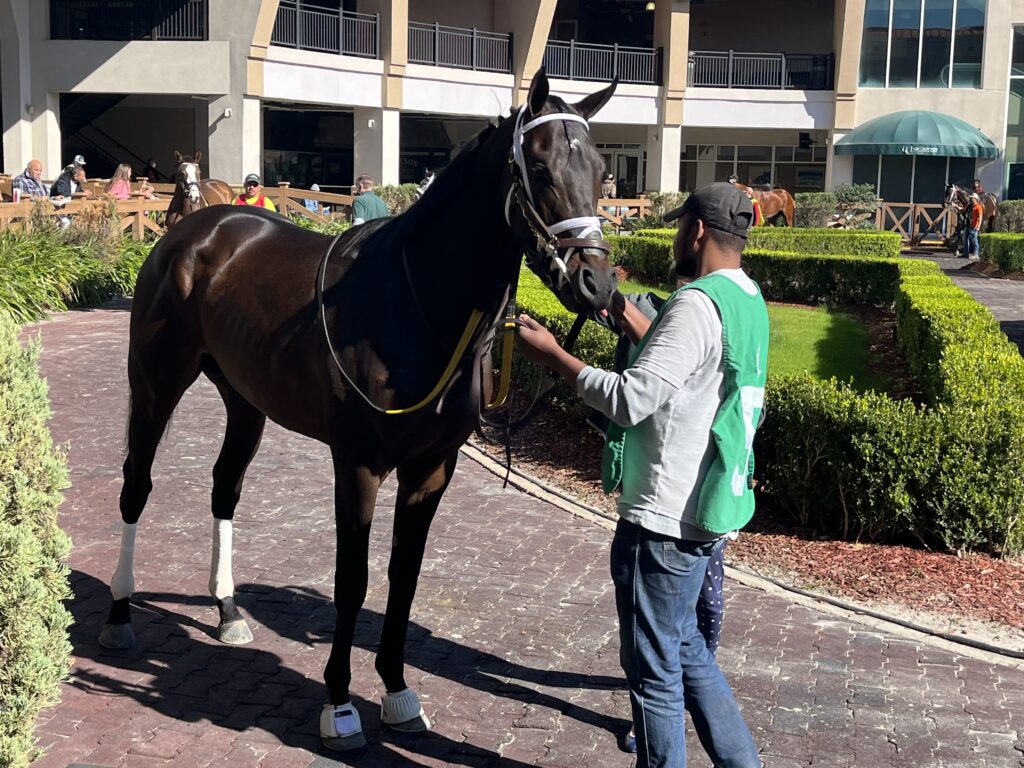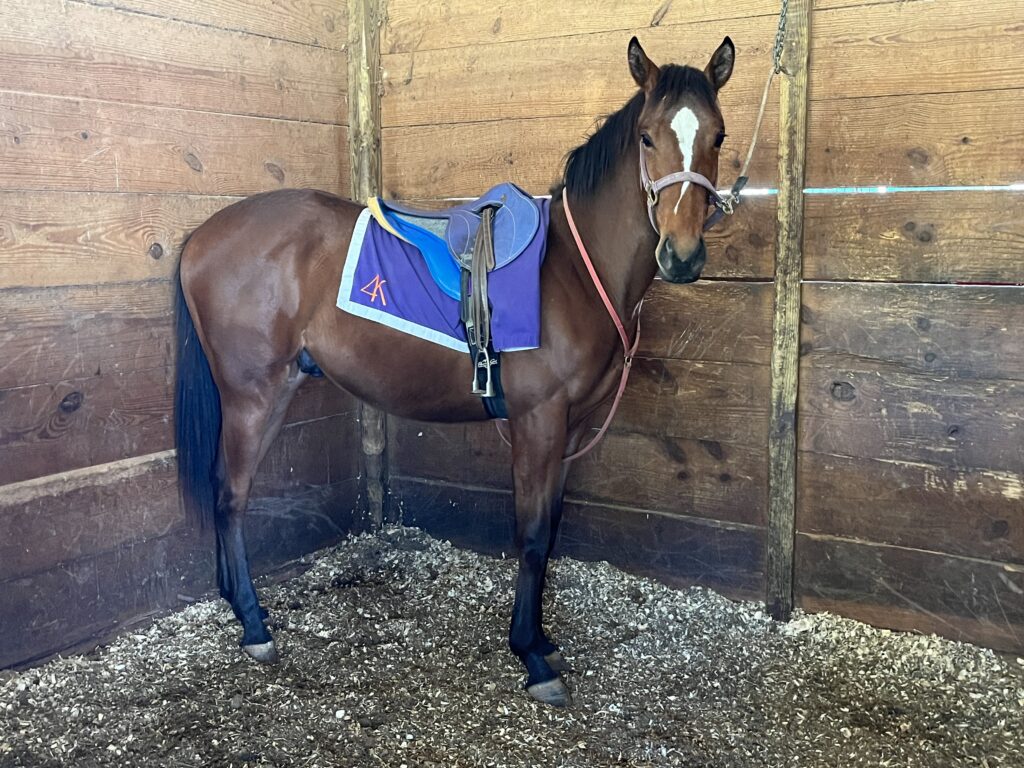Last updated: April 3, 2022
My niece loves talking to her horse, and she is curious if her horse is learning to understand human words. Her curiosity also has me wondering the same thing, so I decided to research whether horses understand words, and if so, which ones.
Horses can understand and remember words with few syllables. However, their understanding relies on the unique pitch, tone, and length of the voice and other riding aids. And horses are excellent listeners, so it’s essential to know their needs and limits when interacting with them regularly.
Horses are smart and intuitive animals, qualities that make them good human companions. Their compatible nature relies on their ability to understand visual and vocal cues. Let’s learn more about them.

How many words can horses understand?
I have often wondered how many total words a horse can understand. The idea that you can conveniently teach your horse dozens of word commands is a nice one but is it actually plausible?
Horses can typically learn about 10 to 15 words, though there is no defined limit. But we know they tend to respond to consistent commands or sounds that convey certain emotions.
Horses don’t think of words as we do. They listen for sounds that direct them to perform a specific action because they want to please their handler.
To better understand this concept, let us look at what sort of communication horses expect from each other in their natural environments.
Horses in the wild mostly rely on body language, but verbal cues are also crucial. They may make drawn-out, whining noises when they are calling for their buddies.
Mothers often nicker to express their affection to the babies. A dam’s nickering can become fast-paced and high-pitched when she is concerned. Similarly, horses might snort when they are feeling excited or optimistic.
Then there are the squeals; these generally indicate aggression or a horse’s desire to dominate. There are also other subtle sounds like groaning that can be crucial in social environments.
Even though horses aren’t as talkative as some other domesticated animals, they can clearly distinguish between different sounds and their practical significance.
Specifically, they pay attention to things like the pitch, intensity, and pace of the sound. I wrote a detailed article about different horse sounds and what they mean.
We learn from observing horses communicating with each other in their natural state that they understand and respond to sounds related to practical tasks or those with an emotional value.
Because of the way horses communicate with each other, it’s easier for them to correctly respond to fundamental verbal cues from us like “walk” or “whoa” better than more objective commands like “step up” or “trot.”
Understanding horse communication is crucial when training horses. Horses closely relate the words to a rider’s voice and memorize them respectively. Buoyant tones can urge the horse to be more active.
Harsh, low-pitched tones might cause the horse to feel afraid, while gentle or cheerful tones will usually be associated with favorable situations. A horse’s memory might even be sensitive to the accent of your voice.
It’s also why I like to think that every rider has a unique relationship with their horse. Horses used to feminine voices might have difficulty following a male voice due to the general pitch difference.
Horses may learn and memorize verbal noises or exclamations like clucking, “good girl!” or “whoa!” with more ease. Also, many horses only remember and understand words when specific physical cues accompany them.
All in all, consistency in the sound’s pitch and tone, and the function of the command determine how effectively a horse can memorize different words.

9 words and sounds horses understand
Many horse owners, grooms, and trainers use vocal prompts when working with horses, and they typically respond well to specific words, tones, and sounds. Here is a list of some common commands horse owners teach their horses:
- Whoa
- Walk
- Wait
- Back
- Easy
- Stand
- Over
- Cluck
- Kissing sound
What are some verbal cues horses understand?
There are different words riders can use to communicate with their horse. However, there are specific verbal cues and tones most horses understand and respond to better than others.
Horses usually understand and respond to verbal cues given in a calm, consistent way. They have difficulty understanding words with more than two or three syllables.
Clucking is a universal sound used by horse riders. People use it for different purposes, but it’s most often used to let the horse know to move forward or change its gait.
Clucking is also very useful because it sounds the same every time you do it. A steady “whoa” is generally used to tell your horse to stop moving. The sound should be loudest at the beginning and lowest at the end – almost an intense sighing noise.
Then there are general terms like “stop,” “walk,” “back,” “trot,” “over,” “step up,” etc. But the words for these commands vary widely throughout different regions and cultures.
An effective horse command is not very lengthy and is always given in the same voice tone. Using physical cues to express the order can also help make the horse understand the words.

Do horses like it when you talk to them?
I’ve always liked talking to my horses when tending to them, and they seem to listen better than most humans. I’ve often wondered if the feeling is mutual, do my horses like that I speak to them so much, or is it annoying to them?
Horses like to be spoken to in a calm, generally low-pitched, and natural voice. They can effectively recognize most emotions in the tone of your voice and react accordingly.
Successfully recognizing the tones of its peers is a fundamental part of living for wild horses. And with time, horses get accustomed to their human companion’s voice, and it learns to connect tones and phrases to specific things.
Some of my horses often greet me with a short whinny or neigh when I meet them in the morning. These neighing sounds are also exchanged between horses greeting each other over long distances.
Horses also expect low nickering from each other to verify feelings of affection, trust, and safety. The nicker is typical when horses are close to each other, so they expect it from an acquaintance. For me, nickering has become the characteristic sound of hello when it’s feeding time.
Because horses allow humans to ride them and consider them companions, they also expect verbal and emotional communication from us. Casually talking to your horse and showing affection through your actions, like stroking or scratching, can foster a healthy relationship.
Can a horse remember you?
You might wonder if your horse still remembers you after a long absence. Assume you sell your horse and don’t see it for a couple of years. Would it remember you if you see it at a horse show?
Horses have excellent memories and typically remember their owners and companions their whole lives. Their memories are even stronger if they developed an emotional tie with their owner’s voice and character.

Horses rely on and build long-term relationships with their natural equine partners. The bond horses make in the wild increases their chances of survival as a herd. Thus, they learn to remember faces, voices, and behaviors from a young age.
Research shows that people who treat horses favorably are much more likely to be remembered by the animal than those who either show no care or mistreat them.
Horses’ long-term memory isn’t the only example of equine intelligence. They’ve displayed the ability to recognize months-old photographs of their owners and successfully associate audio recordings with the respective human, indicating they have a solid visual and auditory memory.
Do horses get attached to their owners?
I regularly witness horses openly expressing affection for their owners after even brief separations. Unfortunately, I have also seen more than a few horses suffer from stress after being sold to a new owner.
Horses are very easily attached to a person that treats them well. Given their intelligence, excellent memory, and natural tendency to live in groups, they are arguably some of the most loyal domesticated animals.
Horses are often observed to grieve in subtle ways when they lose an equine or human companion. Though their grief is not as complex and pronounced as that of humans, it is undoubtedly real.
The presence of grief also means that horses get firmly attached to their permanent owners. This effect is more evident in horses that have been with their owners from birth.
Horses raised on their owner’s ranches show a unique enthusiasm or bond that isn’t so frequently found in horses you acquired as adults. The mental health and possibly the horse’s performance are dependent on a healthy attachment to its human companions.
Horses are excellent companions. Their extensive hearing range means that they can listen to sounds very well. When appropriately trained, they can effectively memorize several commands. They also associate positive emotions with their caring owners and tend to remember them for several years.
FAQ
What sounds do horses make?
Horse sounds include snorts, squeals, neighs, and nickers. These convey moods, greetings, and warnings; there are eight primary horse sounds.
You can learn more about the sounds horses make in this article: Horse Sounds: Why They Neigh Plus 7 Other Verbal Signals

About the Author: Miles Henry
Lifelong Horseman | Racehorse Owner | Published Author
Miles Henry brings over 25 years of hands-on experience training and owning Thoroughbred racehorses. Raised with Quarter Horses and Appaloosas, he’s spent a lifetime learning from horses—on the track, in the barn, and in the field. Today, he runs a small but successful racing stable in Louisiana and shares real-world insights on HorseRacingSense.com, helping horse owners, fans, and bettors navigate the sport with confidence.
📚 Books: View Miles’s books on Amazon »
🎧 Podcast Guest: Animal Tales Ep. 32 |
YouTube Interview
📩 Newsletter: Sign up for racing tips and horse care advice »
🔗 Follow Miles:
Twitter |
Facebook |
YouTube


